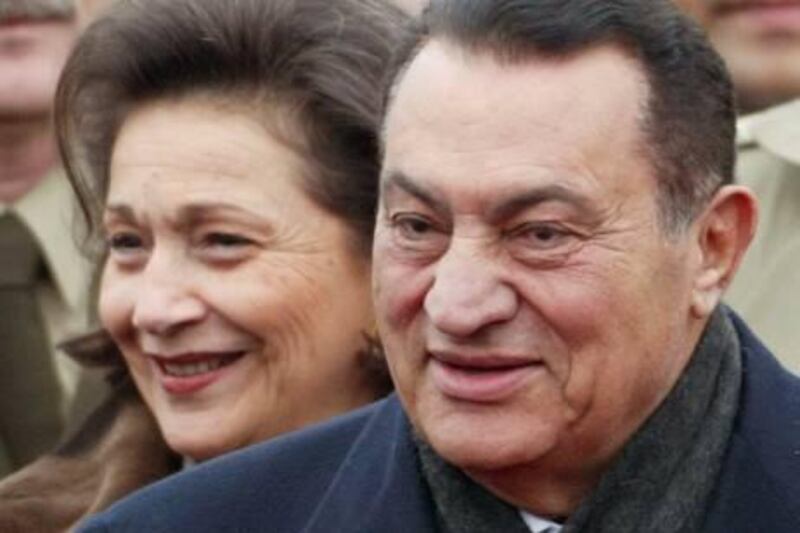CAIRO //Egyptian investigators ordered the country's former first lady released yesterday after she promised to turn over property and assets worth millions of dollars to the state.
Suzanne Mubarak's deal with investigators was approved the same day as a news report suggested that her husband, Hosni Mubarak, the former president who is in detention at a hospital, was seeking a similar release in exchange for a public apology for violations committed by his government.
Such a deal would offer Egypt's new military rulers an alternative to a politically divisive trial of their former commander in chief, but would doubtless meet opposition from hundreds of thousands of protesters who have called for his imprisonment.
Mrs Mubarak, 70, identified by her maiden name, Thabet, was ordered freed by Assem el Gohary, the deputy minister of justice, MENA, the state news agency reported. Mr el Gohary leads the Illicit Gains Authority, a government investigative body that had ordered Mrs Mubarak's detention last Friday.
Ms Mubarak's detention was no longer justified "after she turned over all the money she amassed illicitly", Mr el Gohary said in a statement.
Earlier yesterday, Mohammed el Guindy, the minister of justice, told Al Arabiya: "Should Suzanne Mubarak return money, that would be enough for the judiciary."
On Monday, Mrs Mubarak gave the Illicit Gains Authority power of attorney over a villa in Cairo and two bank accounts, MENA reported.
Altogether, the assets are worth as much as 24 million Egyptian pounds (Dh14.8m).
Authorities had ordered the detention of Mrs Mubarak on allegations that she abused her authority to enrich herself and her husband. She reportedly passed out on hearing the news, and was kept under medical supervision for the last four days at the same hospital in Sharm el Sheikh as her husband.
Misuse and embezzlement of government funds has become a potent political flashpoint in Egypt in recent weeks as the transition government prepares a budget for its next financial year, which begins on July 1.
Doctors in public hospitals went on strike across the nation yesterday to demand that the government increase spending on health care to 15 per cent of the budget, from the current level of 3.5 per cent. The strike was the latest in a string of labour actions in which government workers have pushed for higher wages.
Doctors at hospitals across Cairo rallied with signs and banners demanding a salary increase to 1,200 pounds (Dh741) a month from the current average of less than 400 pounds. They also called for the resignation of the minister of health and better medical supplies for patients. Doctors in emergency rooms and maternity wards remained at their posts.
Approximately 85 per cent of doctors in public hospitals took part in the strike, according to Mona Mina, a physician and one of the strike's organisers.
Mohammed Hassouna, a resident physician in the department of general surgery at Mounira Hospital near downtown Cairo, said: "We're talking about a re-distribution of the budget, for example, from the Ministry of Interior to us.
"What is the priority of the government? Building up the same security apparatus that led to the revolution, or spending more on health care?"
But military rulers appear to be growing increasingly impatient with the strikes and protests, warning that they pose a direct threat to economic growth. Foreign direct investment had dropped to "zero" in the period since the revolution, Major Gen Mahmoud Nasr, the deputy minister of defence for financial affairs, told an economic conference in Cario on Monday.
Hussein Tantawi, the head of the Supreme Council of Armed Forces and Egypt's de facto head of state, said: "The economy in Egypt is suffering due to the sit-ins which give highly dangerous groups and thugs the opportunity to exploit the protests to achieve self-serving and illegitimate goals," according to a translation of the speech published in local press.
Against this backdrop, sources close to Mr Mubarak suggested yesterday that the former president would offer a public apology and give up his assets in exchange for judicial immunity.
The report, appearing on the front page of the independent daily Al Shorouk, said the former president was drafting a letter - with the help of a unnamed "senior journalist" who reportedly helped write his February 1 speech to the nation, to plead for forgiveness and suggest that any mistakes by his government were "the result of consultants or because he got wrong information".
Mr Mubarak, who was placed under detention on April 13, has remained at a hospital in Sharm el Sheikh after he reportedly suffered a heart attack, despite several announcements by officials predicting his imminent transfer to Tora prison outside Cairo. The former president's two sons, Alaa and Gamal, have been at the prison since April 13.
The letter would stress Mr Mubarak's military record, and Mrs Mubarak's leadership of well-known public charities, in asking for forgiveness said the report, which cited anonymous sources close to the former president. The letter will be broadcast on Egyptian and Arab channels, the report added, without offering a time or date.





